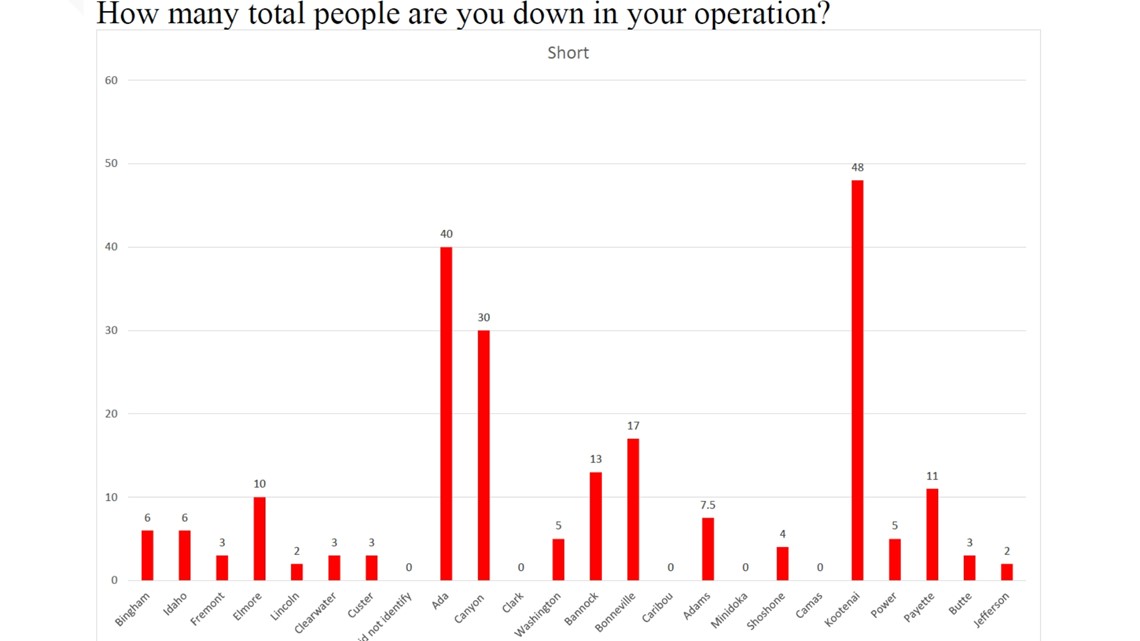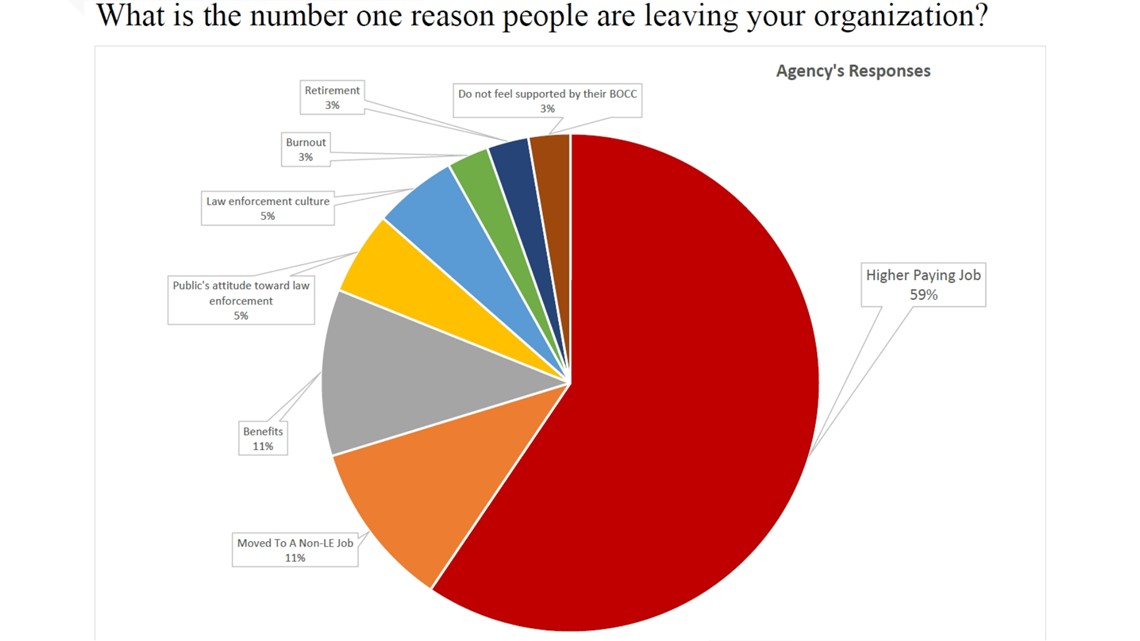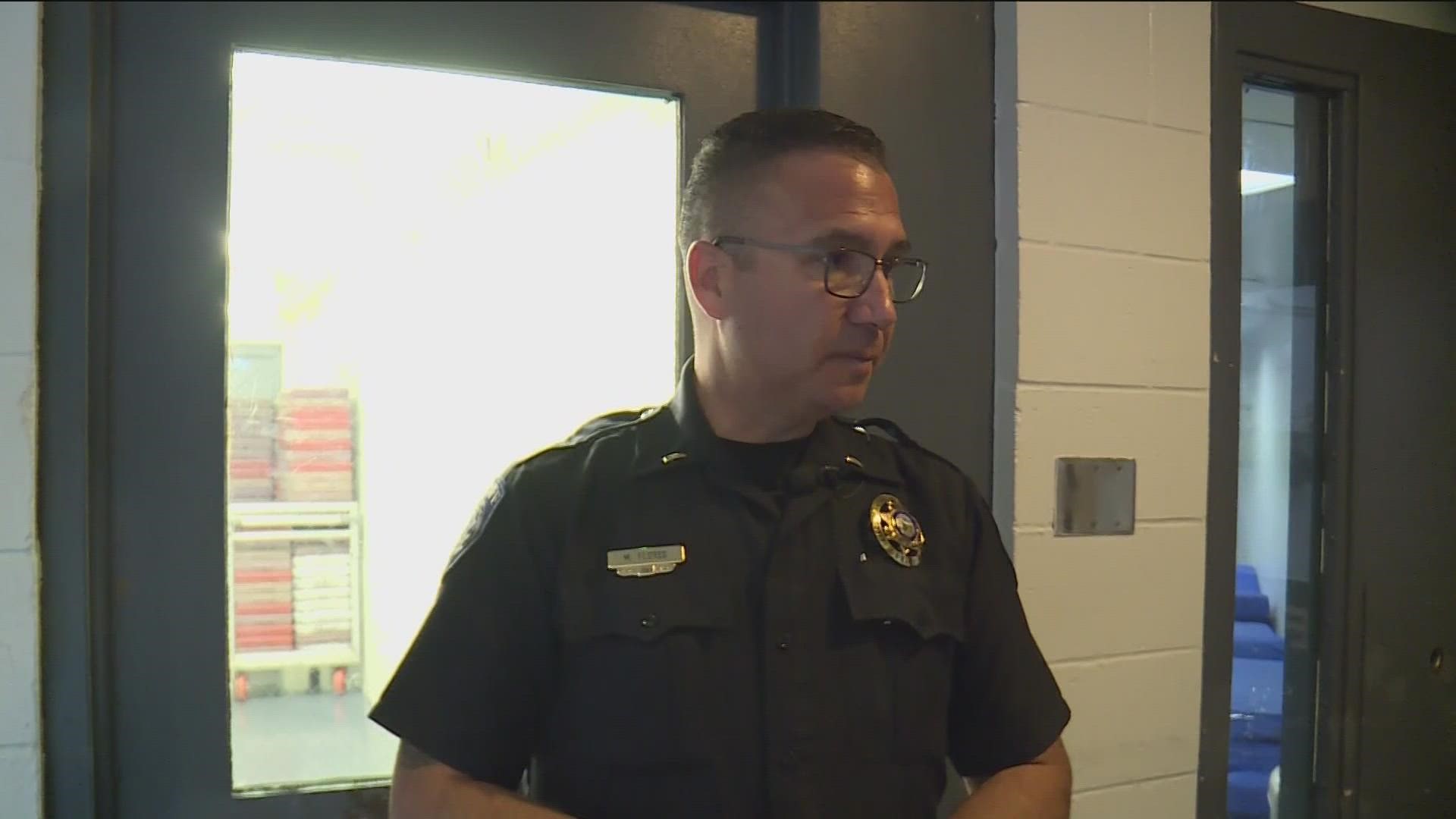CANYON COUNTY, Idaho —
In cities across America, if you call 911, there are fewer dispatchers taking your call, and fewer officers responding.
Law enforcement agencies face a daunting challenge, recruiting and retaining staff. Some agencies are in crisis, with staffing shortages impacting services, and forcing them to get creative to meet an increasing workload demand, with less supply.
Multiple factors drive this shortage, as concern, scrutiny and distrust of policing mount due to high profile excessive force incidents, like the killing of George Floyd. While Idaho did not see protests or calls for budget cuts to the same degree as other states, we are not immune to this shortage.
From Canyon County in the West, Kootenai County in the North, and Bonneville County in the East, law enforcement agencies across Idaho are struggling to hire, and retain, officers and staff.
As the state sees an influx of newcomers, low unemployment, and a hot housing market, coupled with record inflation, some law enforcement agencies are struggling with shortages and burn out, while battling increasing crime.
“Canyon county is 602 square miles,” Brian Crawford said. “Let's head out towards Parma and that'll give you an example of how long it takes to get to say the south half of the county from the northern half of the county.”
Crawford has been a Patrol Lieutenant with the Canyon County Sheriff’s Office (CCSO) for more than 20 years.
“It's a passion. it it's kind of in my blood. I'm second generation doing this,” Crawford said.
Crawford, and the rest of the department, have seen the number of patrols dwindling since he first started.
“Our population has more than doubled, our calls for services more than doubled. And yet, I have less staff on patrol right now than I did 20 years ago. The response times are a lot longer to get to your average call, whether it's a burglary or an accident or any number of calls,” Crawford said. “We don't have as much time to be proactive as we used to.”
With a smaller staffing size, every deputy is crucial.
“Two weeks ago, we had two of our guys get either injured or sick. That dropped that patrol team down to four bodies, and we can't run with that few people,” Crawford said.
Morgan Romero: What does that mean for the streets of Canyon County?
“That leaves no one for emergent calls, or emergency calls, maybe ISP can back us maybe they can't. That's where we're headed,” said Canyon County’s Sheriff Kieran Donahue.
“We're in crisis in law enforcement,” Sheriff Donahue said. “The citizens aren't in crisis yet, but they will be if we do not right this ship about a) recruitment and b) retention. And that comes down to money. It comes down to wages.”
Data from CCSO shows that new recruits start in the jail making approximately $23 an hour. By their fifth year, deputies make between $27 and $31 an hour. While new recruits at Ada County Sheriff's Office (ACSO) start out making a little more, but by year five, they can make $9 to $13 an hour more.
“Instead of 75 or 100 people applying for an opening, we have eight, six, two,” Sheriff Donahue said. “So that applicant pool has shrunk dramatically. We're all picking from that same pool; whose got the best wages? Because people are gonna take care of their families. You know what, I don't blame them.”
After five years with Nampa Police, officers make $32.88 an hour, which is more than Canyon County deputies make on patrol after 25 years.
The Idaho Sheriff's Association polled 24 of the state's 44 sheriff's offices this summer, they found record-low staffing crippling several agencies, big and small.


Kootenai county, for example, is down 22 deputies total in their jail and patrol, 20% of their sworn positions.
Canyon county is down 26, mostly in the jail, 16% of their total deputies.
Payette is also feeling the strain with its jail only half-staffed.
Many of the agencies polled, including Ada and Canyon Counties, desperately need dozens of people to fill critical administrative jobs.


The survey shows the biggest reasons agencies cannot hire or keep employees is low wages. Among other reasons, they also cite the public's attitude toward law enforcement, the dangers officers face, hiring standards and culture. The survey shows many deputies and staff are leaving for jobs outside law enforcement.
“In terms of certified detention officers, I'm down an entire team,” Sheriff Donahue said. “we're forcing mandatory overtime in that jail. We're to the point of forcing patrol officers to not be on patrol or on their days off work inside the jail
“We're beyond critical stage at this point,” said Martin Flores a CCSO lieutenant who oversees the Canyon County jail. “It's critical, this place continues to function. It's constitutionally mandated for a sheriff to run a jail.”
Romero: Why are people leaving Canyon County Sheriff's Office?
“Historically It's been, you know, to further their career advancement. They want to move out from the jail to patrol or to a different part of law enforcement. And, at times, we're not able to facilitate that maybe on their timeline,” Flores said. “But what we're seeing a lot of now is people just leaving the profession altogether. I mean, they can't, they don't want to deal with the public climate anymore, they don't want to deal with low wages.”
Romero: How much overtime are your guys in the jail working?
“Three days, three shifts a day. So next pay period I have 180 overtime shifts that must be covered,” said Flores.
Romero: What does that do you think for their mental health?
“It's hard on their morale. It really is. and it's hard on anybody,” Sheriff Donahue said.
Romero: Do you think people are burning out?
“I think that it's starting to get there. When I do exit interviews with them, and we talk about it, you know, one of the questions is, what can we do to improve, you know, the overall atmosphere and morale? And the common answer is more staff,” Flores said.
“The role of government is public safety priority number one,” Sheriff Donahue said. “Without it, you have Portland, you have Seattle, you have Baltimore, Minneapolis, the list goes on and on and on.”
Idaho jail standards require a minimum of 17 people per shift to staff a county jail. Critical staffing to function is 15, on average each day, Canyon County has 16.
Because Canyon County had so many people leave recently, they are requiring mandatory overtime in their jail, meaning a lot of taxpayer dollars.
There are always valleys and peaks in overtime pay, because people get sick or take vacation, but last month alone, Flores said they paid out more than 100-thousand dollars in overtime, double what they paid in June and almost three-times what they paid out in February. In fiscal year 2022, they paid a total of almost $600 thousand in overtime.
Sheriff's offices struggling in other regions in Idaho
Like the Treasure Valley, Kootenai and Bonneville counties are seeing record growth and skyrocketing housing prices. They had an influx of lateral recruits from other agencies about two years ago, but now believe that pool is drying up.
They say it's difficult to attract new hires with expensive homes prices, and the low wages government jobs offer compared to the private sector. They note that the people moving in to their areas are not necessarily workforce population.
Kootenai County Sheriff Bob Norris says they are at crisis levels and there are "cracks in their law enforcement infrastructure". The agency is down so many officers that they are pulling people from patrol into dispatch and the jail, Norris says. That, in turn, affects people's safety, he says.
Kootenai County is seeing an increase in violent crime and calls for service.
"We are at critical mass," Norris told 7Investigates in a phone interview. "We expect quality of life in the state of Idaho and if we don’t get a handle on infrastructure we can expect higher crime and lower quality of life."
Bonneville County is also seeing an increase in critical crimes, according to Sheriff Sam Hulse.
Hulse says his deputies can't do proactive policing because they're stretched so thin. There's a reduction in self-initiated activity because deputies simply don't have the time, which indicates to him as a leader that his staff are under pressure.
Like Canyon County, his jail deputies have been working mandatory overtime over the past year and they are experiencing high burn out.
Both sheriffs echo Canyon County's sentiments and say the biggest reason people are leaving - or not joining - their agencies is due to pay.
"There's no question that cities have an advantage over counties," Hulse said in a phone interview, "Cities have the ability to adjust their levies in ways that counties can’t, so they have other options counties don’t have."
Cities are structured in a way that provides a higher density of services because that's where those services are required. However, growth and urban sprawl are occurring in counties which places an increased burden on their services.
Not only is Bonneville struggling to hire and keep up with attrition, but they also need to add more positions because of the growth.
"We're trying to keep pace but also running on a treadmill that's going faster," Hulse said. "We are headed to crisis levels rapidly if we do not adjust our efforts rapidly as a profession."
Hulse commends his commissioners for negotiating cost of living increases in the new budget and giving employees $500 bonuses to offset rising inflation.
7 Investigates:
KTVB’s award winning investigative team reports on local, crime, and breaking news across Idaho.

